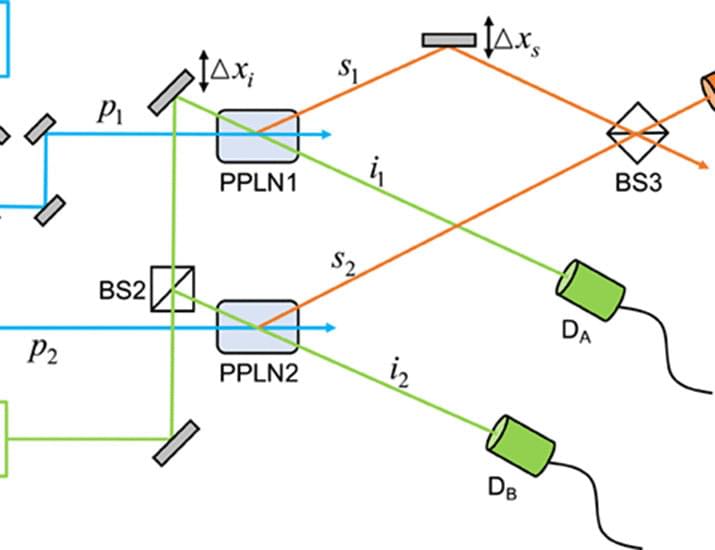Complementarity relation of wave-particle duality is analyzed quantitatively with entangled photons as path detectors.



Time-resolved photon counting plays an indispensable role in precision metrology in both classical and quantum regimes. Therein, time-correlated single-photon counting (TCSPC) [1] has been the key enabling technology for applications such as fluorescence lifetime microscopy [2], time-gated Raman spectroscopy [3], photon counting time-of-flight (ToF) 3D imaging [4], light-in-flight imaging [5], and computational diffuse optical tomography [6]. For all these applications, one of the most important figures of merit is the single-photon timing resolution (SPTR, also referred to as photon counting timing jitter). The TCSPC SPTR is limited by the available single-photon detectors. For example, photomultiplier tubes typically provide an SPTR larger than 100 ps [7]. Meanwhile, superconducting nanowire single-photon detectors have superior SPTR in the sub-10-ps range [8, 9]. However, cryogenic cooling significantly increases the system complexity. Single-photon avalanche diodes (SPADs) operate at moderate temperature, which makes them a popular choice for various applications mentioned above. Nevertheless, their SPTR is still limited to tens-of-picoseconds level [10]. On the other hand, orders-of-magnitude enhancement on SPTR is required for many challenging applications such as the study of ultrafast fluorescent decay dynamics [11,12].
In this Letter, we demonstrate a time-magnified TCSPC (TM-TCSPC) that achieves an ultrashort SPTR of 550 fs using an off-the-shelf single-photon detector. The key component is a quantum temporal magnifier using a low-noise high-efficiency fiber parametric time lens [13,14] based on four-wave mixing Bragg scattering (FWM-BS) [15 – 17]. A temporal magnification of 130 with a 97% photon conversion efficiency has been achieved while maintaining the quantum coherence of the signal under test (SUT). Detection sensitivity of -{95}\;rm{dBm}$ (0.03 photons per pulse), limited by the spontaneous Raman scattering noise, is possible and allows efficient processing and characterization of quantum-level SUT. The TM-TCSPC can resolve ultrashort pulses with a 130-fs pulse width difference at a 22-fs accuracy. When applied to photon counting ToF 3D imaging, the TM-TCSPC greatly suppresses the range walk error (RWE) that limits all photon counting ToF 3D imaging systems by 99.2% (130 times) and thus provides high depth measurement accuracy and precision of 26 µm and 3 µm, respectively. The TM-TCSPC is a promising solution for photon counting at the femtosecond regime that will benefit various research fields such as fluorescence lifetime microscopy, time-gated Raman spectroscopy, light-in-flight imaging, and computational diffuse optical tomography.

Like ripples in a pond, electrons travel like waves through materials, and when they collide and interact, they can give rise to new and interesting patterns.
Scientists at the U.S. Department of Energy’s (DOE) Argonne National Laboratory have seen a new kind of wave pattern emerge in a thin film of metal oxide known as titania when its shape is confined. Confinement, the act of restricting materials within a boundary, can alter the properties of a material and the movement of molecules through it.
In the case of titania, it caused electrons to interfere with each other in a unique pattern, which increased the oxide’s conductivity, or the degree to which it conducts electricity. This all happened at the mesoscale, a scale where scientists can see both quantum effects and the movement of electrons and molecules.

The next generation of computing and information processing lies in the intriguing world of quantum mechanics. Quantum computers are expected to be capable of solving large, extremely complex problems that are beyond the capacity of today’s most powerful supercomputers.
New research tools are needed to advance the field and fully develop quantum computers. Now Northwestern University researchers have developed and tested a theoretical tool for analyzing large superconducting circuits. These circuits use superconducting quantum bits, or qubits, the smallest units of a quantum computer, to store information.
Circuit size is important since protection from detrimental noise tends to come at the cost of increased circuit complexity. Currently there are few tools that tackle the modeling of large circuits, making the Northwestern method an important contribution to the research community.

Sign up for Morning Brew for free today: https://bit.ly/mbadamsomething.
Turns out we’ve been driving on McRoads this entire time.
Check out my Patreon tiers: https://www.patreon.com/adamsomething.
Join my Discord: https://discord.gg/2YcarWsc8S
Images of Barcelona I’ve used:
https://unsplash.com/photos/X6o9QhsxkmM
https://unsplash.com/photos/hVhfqhDYciU
https://unsplash.com/photos/c8vMIaXR784
Thumbnail basis:
https://unsplash.com/photos/2-B9yMEh2mk

In a press statement from the UK government, the work is described as a “world first.” The material is being used as part of a trial, meaning that the UK government will keep a close eye on the newly-laid surface over the coming years to discern whether graphene can be used more widely to increase the durability and lifespan of roads.
The concept has been meticulously tested in labs, now it’s time for a real-world application.

WASHINGTON — Israel Aerospace Industries will debut REX MK II, its newest ground robot set to be fielded to British troops, at DSEI, the London-based defense exhibition, which begins Tuesday. IAI signed a contract with the UK in the second quarter of the calendar year and has sold the vehicle to other European countries, Rani Avni, IAI’s deputy general manager for robotics and autonomous systems, told Defense News in a Sept. 12 interview ahead of the show. He declined to identify the other countries.
Israeli defense company unveils its latest ground robot at DSEI as market for light robotic combat vehicles heats up in the European theater.

Israeli scientists are harnessing the “destructive” qualities of allergy-causing cells, as part of a bold attempt to pioneer a new immunotherapy for fighting cancer. A research team from Tel Aviv University has found that eosinophils, white blood cells that induce allergies, significantly reduce the growth of human tumors in vitro, and mouse tumors in the body. Nine days after mice were injected with eosinophils, the overall size of tumors per mouse averaged half that of mice who weren’t injected.
Puncture-proof tires have been an intriguing concept for many years. Tire maker, Michelin, has been working on it since 2005 and after more than a decade of work, it is now closer to reality. The company took its puncture-proof tires for a spin for the first time, on an electric vehicle, in line with the company’s goals of being more sustainable in the future.
More than three billion tires are produced annually around the world. Once beyond their lifetime, these tires usually end up in landfills. They are also at risk of catching fire and releasing toxic fumes into the atmosphere. Like with other things manmade, one way of making tires more eco-friendly is to make them out of naturally occurring material. The second is to reduce instances that cause wear and tear and render the tires useless. French tire manufacturer, Michelin, is using both these approaches to make its tires more ‘green’ in the future.
Through its Vision Concept, the company wants to make tires that are airless, rechargeable, connected, and sustainable. The Unique Punctureproof TIre System (UPTIS) is the airless tire that, thanks, to its unique design, does not require air filling and, never gets punctured either.